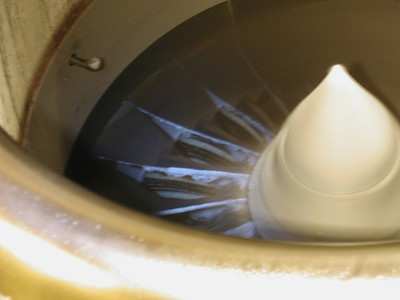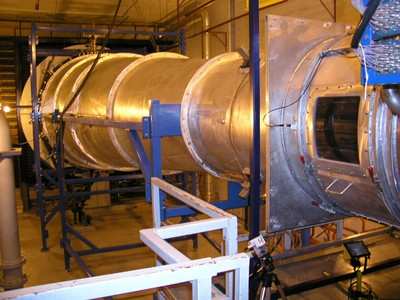New Icing Tunnel Used To Test 1,000 - 25,000 Lb Thrust
Engines
 Business-jet engine manufacturers
requiring a facility to carry out engine certification tests are
taking notice of the facilities available at the National Research
Council of Canada's Institute for Aerospace Research (NRC). Recent
upgrades to the NRC propulsion facilities enable it to test new
engine classes, particularly business jet engines, and deliver
high-quality, real-time data right to a client's home base. NRC's
northern site in Ottawa, Canada, moreover, provides an abundance of
cold air, resulting in exceptionally cost-effective engine icing
certification programs.
Business-jet engine manufacturers
requiring a facility to carry out engine certification tests are
taking notice of the facilities available at the National Research
Council of Canada's Institute for Aerospace Research (NRC). Recent
upgrades to the NRC propulsion facilities enable it to test new
engine classes, particularly business jet engines, and deliver
high-quality, real-time data right to a client's home base. NRC's
northern site in Ottawa, Canada, moreover, provides an abundance of
cold air, resulting in exceptionally cost-effective engine icing
certification programs.
NRC, which has been testing engines since the 1940s, carries out
icing tests for many Pratt & Whitney Canada (PWC) engines. It
recently also conducted icing certification tests on GE Aircraft
Engines' new CF34-10. Jeff Bird, Manager of the NRC facility, said,
"Most of our icing has been with engine companies; however, we've
recently started doing work directly with airframe manufacturers.
We will be testing a business jet engine in a nacelle next year,
for example. To carry this out, we've designed a new icing tunnel
to surround the nacelle so that airflow conditions duplicate what
will happen in the air. We've done this before for helicopters, but
it's a new thing for us to offer it for jets."
NRC's site in Ottawa, Canada, provides a reliably cold winter
location for icing tests. Its icing season runs from the beginning
of December to the end of March, with external temperatures ranging
from near freezing to -7 F (-22 C), to match the typical
certification matrix. Bird said, "We can get very precise icing
conditions and handle any size of business jet in this
facility."

NRC can test engine families in the 1,000 - 25,000 lb thrust
range. It offers support for full-authority digital engine control
(FADEC) engines, as well as high-quality, real-time data on
temperatures, pressures, strains, fuel and speeds, for as many as
1200 points throughout the engine. This information can be
digitized at very high frequency (up to 100 kHz) and stored for
post-analysis. It can also be transmitted to the client's home base
while a test is running. Full video capability and analysis is an
integral part of the data capture.
The staff and facilities at NRC offer a broad range of gas
turbine testing services, including adverse weather (icing, fog,
ice sheet, hail storm), bird ingestion, and endurance testing, as
well as complex development work. Two of its four test cells are
available for icing certification, while the others can be used to
test turboshaft and helicopter engines, as well as for turboprop
development. Rigs to test and evaluate bearing and seal components
are also available.
Bird said, "We provide everything - design, construction,
testing and analysis. Our ability to carry out a complete turnkey
project is unique, and our processes are well-known and
well-accepted by the FAA and Transport Canada. We're also very
cost-effective because we use ambient air, while refrigeration is
available for small-engine tests."

The National Research Council Institute for Aerospace Research
is Canada's national aerospace laboratory, undertaking and
promoting research and development in support of the Canadian
aerospace community, in matters affecting the design, manufacture,
performance, use and safety of aerospace vehicles.
 ANN's Daily Aero-Linx (05.06.25)
ANN's Daily Aero-Linx (05.06.25) ANN's Daily Aero-Term (05.06.25): Ultrahigh Frequency (UHF)
ANN's Daily Aero-Term (05.06.25): Ultrahigh Frequency (UHF) ANN FAQ: Q&A 101
ANN FAQ: Q&A 101 Classic Aero-TV: Virtual Reality Painting--PPG Leverages Technology for Training
Classic Aero-TV: Virtual Reality Painting--PPG Leverages Technology for Training Airborne 05.02.25: Joby Crewed Milestone, Diamond Club, Canadian Pilot Insurance
Airborne 05.02.25: Joby Crewed Milestone, Diamond Club, Canadian Pilot Insurance




